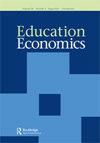数字设备使用和科学素养:使用2015年国际学生评估项目(PISA)数据的考试
IF 0.9
Q3 Social Sciences
引用次数: 0
摘要
摘要:本文利用经合组织2015年国际学生评估项目(PISA)的数据和内源性治疗效应模型,研究了不同强度的学术数字设备使用对科学学习成果的影响。当我们不区分设备使用的位置时,我们发现,在大多数国家,更多地使用设备可以帮助学生提高他们的科学成绩。当我们单独考虑学校和校外使用时,我们发现上述积极结果是由校外数字设备使用驱动的,而在学校增加设备使用则有更多的负面结果。本文章由计算机程序翻译,如有差异,请以英文原文为准。
Digital device use and scientific literacy: an examination using Programme for International Student assessment (PISA) 2015 data
ABSTRACT This paper uses data from the OECD’s 2015 PISA and an endogenous treatment effects model to investigate the impact of different intensities of digital device use for academic purposes on science learning outcomes. When we do not differentiate the location of device use, we find that greater use can help students improve their science scores in most of the countries. When we consider school and outside-of-school use separately, we find the above positive results are driven by outside-of-school digital device use and that there are more negative results of increased device use at school.
求助全文
通过发布文献求助,成功后即可免费获取论文全文。
去求助
来源期刊

Education Economics
EDUCATION & EDUCATIONAL RESEARCH-
CiteScore
2.00
自引率
8.30%
发文量
38
期刊介绍:
Education Economics is a peer-reviewed journal serving as a forum for debate in all areas of the economics and management of education. Particular emphasis is given to the "quantitative" aspects of educational management which involve numerate disciplines such as economics and operational research. The content is of international appeal and is not limited to material of a technical nature. Applied work with clear policy implications is especially encouraged. Readership of the journal includes academics in the field of education, economics and management; civil servants and local government officials responsible for education and manpower planning; educational managers at the level of the individual school or college.
 求助内容:
求助内容: 应助结果提醒方式:
应助结果提醒方式:


